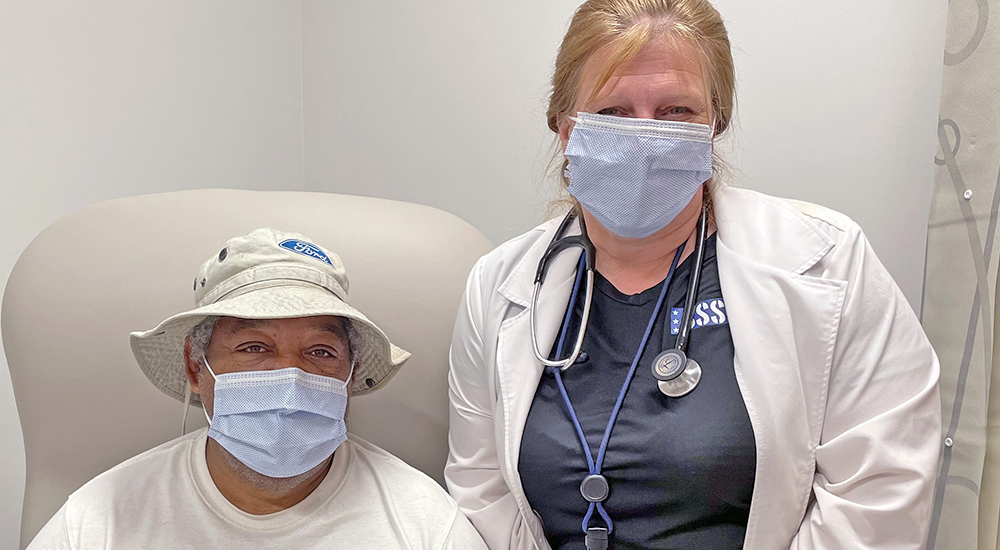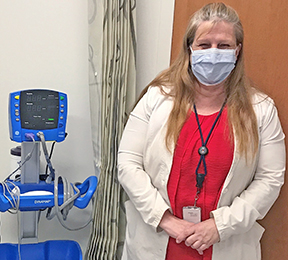VA Nurses have long been an innovative group. Whether adapting bar coding for safer medication management, or inventing a way for Veterans to give themselves eye drops, their care has always been focused on making their patients’ lives better. At Cape Girardeau VA, Lorilea Johnson, nurse practitioner, is no exception. She has pioneered a protocol for urgent care providers to assess the risk of a cardiac event occurring in patients experiencing chest pain.
The protocol has potential for use in urgent care facilities nationwide.
“In health care, we use a lot of tools to help with decision making,” says Johnson. “Even though someone is ‘low risk,’ that does not mean ‘no risk.’ There is no guarantee. The tools guide the plan of care.”
Johnson explains that when it comes to chest pain, “The one tool people know the most is the HEART score.” The HEART pathway for assessment and possible early discharge reviews history, ECG, age, risk factors and initial troponin levels.
Guidelines not always clear in walk-in clinics
“But in walk-in urgent care, you often don’t have rapid troponin,” says Johnson. “In an ER, the guidelines are clear but if you work in a walk-in clinic, it’s not so clear.”
Johnson adds that in urgent care clinics, “There are no standardized guidelines for treating patients with chest pain, and chest pain sufferers are often referred directly to the emergency room for assessment.”
“Impacts of this practice can include unnecessary crowding of ER facilities, greater potential for over testing, false positive results and needless costs for patients. Providers in the same facility may even approach chest pain differently, which can lead to confusion among staff. Data show that over 50% of chest pain seen in the emergency room is not cardiac-related,” says Johnson.
She set to work to find a better way
With nearly forty years of nursing experience, Johnson is highly qualified for the task. She began her RN career as a cardiac nurse and has served in every conceivable nursing position, starting at 16 as a nurse’s assistant. She advanced to LPN, then RN, BSN, and MSN, and culminated her studies by obtaining a Doctor of Nursing Practice.
It was through research for her DNP that Johnson developed the protocol. “I chose this topic because I think it’s a real issue,” she says. The focus of her research was to increase clinicians’ confidence in keeping and treating patients with low-risk chest pain.
Johnson says she searched “high and low” for evaluative options besides the HEART Pathway and finally settled upon the Marburg Score. “It’s fairly obscure in American medical literature, but very well vetted in Europe,” she says.
Factors in the Marburg Score include age (greater than 65 in women and greater than 55 in men), known clinical vascular disease, chest pain characteristics and patient perception.
Results of the protocol were perfect
The study took place between Nov. 1, 2020, and Jan. 31, 2021. The Journal of Urgent Care Medicine published the study. Johnson trained front line staff, nurses and providers at a rural southeast Missouri urgent care clinic to use the algorithm she had developed when they evaluated “persons 18 or older who presented to the clinic with complaints of chest discomfort.”
In all, 26 patients were evaluated using the protocol. Of the 26, 22 were determined not to be at risk of a cardiac event and were treated on site. The remaining four were sent to emergency rooms.
The results were perfect. Not one of the 22 low-risk patients experienced cardiac events during treatment, or in the 30- and 60- day follow ups. By contrast, all four of those referred to emergency rooms did experience a cardiac event.
“As evidence changes, so should your practice.”
Though the study was small, 100% negative and positive predictive values are promising. Johnson presented her results at Urgent Care Association/College of Urgent Care Medicine 2022 Convention. There, her study received considerable interest from her peers.
Johnson is excited about the potential of her work and encourages further research. She says the health care world’s standards of practice are always changing.
“We use evidence-based practice,” says Johnson. “As evidence changes, so should your practice.”
Topics in this story
More Stories
VA announces positive Veteran satisfaction feedback on telehealth services, including video visits, in the first half of fiscal 2025.
The VA Bay Pines stand down relies on volunteers to connect Veterans facing homelessness with the resources they need.
Thanks to group virtual reality and immersive technology sessions, Veteran Dennis Wagner has found purpose and community after his wife’s passing.






